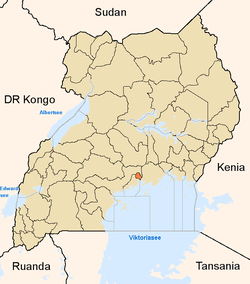Kiira Motors Corporation
| Public | |
| Industry |
Automobile Manufacturing |
| Founded | 2012 |
| Headquarters | Ntinda, Kampala, Uganda |
Key people |
Sandy Stevens Tickodri-Togboa chairman Paul Isaac Musasizi chief executive officer[1] Albert Akovuku chief operations officer[2] |
| Products | Automobiles |
| Website | Homepage |
Kiira Motors Corporation (KMC) is an automobile manufacturing company in Uganda.
Overview
KMC, established in 2012, is the result of a collaboration between Makerere University, College of Engineering & Industrial Design, the Uganda Ministry of Trade, Industry & Cooperatives, and the Office of the President of Uganda. The government of Uganda had invested over US$70 million in the company, as of November 2014. The company has received an allocation of 100 acres (40 ha) of land in the Jinja Industrial and Business Park on which to build an assembly plant.[2] Commercial production is expected to start in 2018.[1]
History
In 2006, students from 25 universities and colleges across the world took part in a project to design a plug-in electric hybrid vehicle. Following that three-year project, in which the United States-based Massachusetts Institute of Technology and Uganda's Makerere University participated, the scientists involved were inspired to embark on a project to develop a "Made in Uganda" hybrid car.[2]
In 2011, the first prototype, the "Kiira EV", was a two-seater electric car produced by Makerere University.[3] Using funding from both the Presidential Initiative on Science and Technology and the Uganda Ministry of Trade, Industry & Cooperatives through the Uganda Development Corporation, Makerere University researchers built the "Kiira EV SMACK", a five-seater sedan hybrid that uses both lithium batteries and petrol.[4]
In 2014, the company acquired 100 acres (40 ha) in the Jinja Industrial Park in the town of Kakira, where it plans to construct an assembly plant.[5] In February 2016, KMC unveiled a 35-seater bus, named "Kayoola", that operates exclusively on solar power.[6]
Vehicle models
As of February 2016, the company has produced the following prototypes:
- Kiira EV, a two-seater, 100 percent electric car.[3]
- Kiira EV SMACK, a five-seater sedan hybrid car that uses both lithium batteries and petrol.[4]
- Kayoola, a 35-seater bus that operates exclusively on solar power.[6]
Ownership
The company is wholly owned by the government of Uganda.[2] The two major shareholders in KMC are Makerere University and the Uganda Development Corporation. A total of US$350 million is being sought by the company from investors in the private sector to construct an assembly plant.[7]
References
- 1 2 Lyatuu, Justus (9 December 2015). "Kiira Motors to employ 10,000 people". The Observer (Uganda). Kampala. Retrieved 4 February 2016.
- 1 2 3 4 Mulupi, Dinfin (25 November 2014). "Introducing the 'Made in Uganda' electric car". Cape Town: Howwemadeitinafrica.com. Retrieved 3 February 2016.
- 1 2 Kavuma, Richard (10 November 2011). "Uganda's first electric car proves the potential of Africa's universities". The Guardian. London. Retrieved 4 February 2016.
- 1 2 Ssekalo, Edward (16 December 2014). "What will it take for Uganda's Kiira EV to succeed where the Nyayo Pioneer failed?". The EastAfrican. Nairobi. Retrieved 4 February 2016.
- ↑ "Uganda to start producing cars in 2018". New Vision. Kampala. 13 July 2014. Retrieved 4 February 2016.
- 1 2 Mohammed, Omar (2 February 2016). "Ugandan engineers have built a solar-powered bus for Africa's roads". New York City: Quartz Africa. Retrieved 4 February 2016.
- ↑ Ahimbisibwe, Patience (3 August 2014). "Makerere University needs Shs1 trillion for car production". Daily Monitor. Kampala. Retrieved 4 February 2016.
